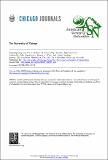Files in this item
Haplodiploidy and the evolution of eusociality : worker reproduction
Item metadata
| dc.contributor.author | Alpedrinha, Joao | |
| dc.contributor.author | West, Stuart | |
| dc.contributor.author | Gardner, Andy | |
| dc.date.accessioned | 2014-09-30T23:01:50Z | |
| dc.date.available | 2014-09-30T23:01:50Z | |
| dc.date.issued | 2013-10 | |
| dc.identifier | 84210961 | |
| dc.identifier | 60fab77a-77bd-47fc-b192-7b71bc6fc8e6 | |
| dc.identifier | 84883826180 | |
| dc.identifier | 000327901800020 | |
| dc.identifier.citation | Alpedrinha , J , West , S & Gardner , A 2013 , ' Haplodiploidy and the evolution of eusociality : worker reproduction ' , American Naturalist , vol. 182 , no. 4 , pp. 421-438 . https://doi.org/10.1086/671994 | en |
| dc.identifier.issn | 0003-0147 | |
| dc.identifier.uri | https://hdl.handle.net/10023/5520 | |
| dc.description | The authors acknowledge the European Research Council, the Royal Society, and Balliol College for funding. | en |
| dc.description.abstract | Hamilton’s haplodiploidy hypothesis suggests that the relatively higher relatedness of full sisters in haplodiploid populations promotes altruistic sib rearing and, consequently, the evolution of eusociality. This haplodiploidy effect works when some broods have a relatively female-biased sex ratio and other broods have a relatively male-biased sex ratio, termed split sex ratios. There is empirical evidence for two scenarios having potentially led to split sex ratios en route to eusociality: unmated queens and queen replacement. A recent analysis of these two scenarios has suggested that haplodiploidy can either promote or inhibit the evolution of eusociality and that the effect is usually small. However, this work made the simplifying assumptions that there is only negligible reproduction by workers and that their offspring have the same sex ratio as those produced by the queen. Here, we relax these assumptions and find that worker reproduction has a negative influence on the evolution of helping, either reducing the extent to which it is promoted or leading to it being inhibited. This is particularly so when workers are unmated and hence constrained to produce only sons, by arrhenotoky. Overall, when parameterized with empirical data, our results suggest that split sex ratios in haplodiploid species have not played an important role in facilitating the evolution of eusociality. | |
| dc.format.extent | 947032 | |
| dc.language.iso | eng | |
| dc.relation.ispartof | American Naturalist | en |
| dc.subject | altruism | en |
| dc.subject | helping | en |
| dc.subject | inclusive fitness | en |
| dc.subject | kin selection | en |
| dc.subject | monogamy | en |
| dc.subject | Sex allocation | en |
| dc.subject | QH301 Biology | en |
| dc.subject.lcc | QH301 | en |
| dc.title | Haplodiploidy and the evolution of eusociality : worker reproduction | en |
| dc.type | Journal article | en |
| dc.contributor.institution | University of St Andrews. School of Biology | en |
| dc.contributor.institution | University of St Andrews. Centre for Biological Diversity | en |
| dc.identifier.doi | https://doi.org/10.1086/671994 | |
| dc.description.status | Peer reviewed | en |
| dc.date.embargoedUntil | 2014-10-01 | |
| dc.identifier.url | http://www.press.uchicago.edu/ucp/journals/journal/an.html | en |
This item appears in the following Collection(s)
Items in the St Andrews Research Repository are protected by copyright, with all rights reserved, unless otherwise indicated.

